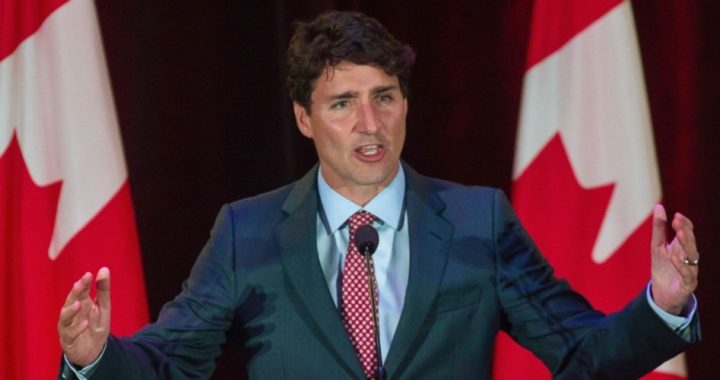
Canadian Prime Minister Justin Trudeau (shown) will meet with President Trump next week for the fourth round of NAFTA talks scheduled for October 11-15, 2017 in Washington, D.C.
As previously reported in The New American, Canada is pushing for progressive changes to NAFTA, which President Trump has previously labeled as the “worst trade deal” ever signed, and has even threatened to withdraw from unless he could renegotiate a “better” deal.
“Personally, I don’t think we can make a deal because we have been so badly taken advantage of,” President Trump said at a rally in Phoenix on August 22 regarding the renegotiation of NAFTA. “They [Canada and Mexico] have made such great deals — both of the countries, but particularly Mexico — that I don’t think we can make a deal. So I think we’ll end up probably terminating NAFTA at some point.”
Canada’s far-reaching progressive demands include strengthening existing labor standards and safeguards, abolishing U.S. right-to-work laws, adding new chapters on the rights of indigenous peoples and gender equality, toughening environmental standards, and addressing global warming/climate change.
Regarding the new “gender” chapters that Canada seeks to add to NAFTA, Canada’s ruling Liberal Party wants, according to the Canadian Broadcasting Corporation (CBC) News, a “feminist North America Free Trade Agreement.”
Although the text of this proposed gender chapter remains secretive, it is said to be “modeled after the gender chapter the Liberal government added to its free trade deal with Chile,” according to the CBC News report. This refers to the 1997 bilateral free-trade agreement between Canada and Chile known as the Canada-Chile Free Trade Agreement (CCFTA).
In June, Prime Minister Trudeau and Chilean President Michelle Bachelet of the Socialist Party of Chile “modernized” the CCFTA by adding a chapter on trade and gender.
The CCFTA is now the second FTA in the world to include women and girls as essential components to long-term economic development. The chapter also reaffirmed both Canada and Chile’s preexisting commitments to United Nations and other international agreements on gender rights.
Article N bis-02 of the CCFTA’s new trade and gender chapter reads:
1. Each Party reaffirms its commitment to effectively implement the obligations under the Convention on the Elimination of all Forms of Discrimination Against Women, adopted by the United Nations General Assembly on 18 December 1979.
2. Each Party reaffirms its commitment to implement the obligations under other international agreements addressing gender equality or women’s rights to which it is a party.
In addition to reaffirming its subordination to the world-government seeking United Nations, the CCFTA also reaffirms its commitment to Agenda 2030, the successor to the UN’s Agenda 21 agreement for “sustainable development.”
Clause 2 of “Article N bis-01: General Provisions” of the CCFTA’s trade and gender chapter reads:
2. The Parties recall Goal 5 of the Sustainable Development Goals in the United Nations 2030 Agenda for Sustainable Development, which is to achieve gender equality and empower all women and girls. The Parties reaffirm the importance of promoting gender equality policies and practices, and building the capacity of the Parties in this area, including in non-government sectors, in order to promote equal rights, treatment and opportunity between men and women and the elimination of all forms of discrimination against women.
Described as “every totalitarian’s dream,” the UN’s Agenda 2030 seeks to establish a heavily regimented technocratic/socialist/communistic global super-state under the guise of “healing mother earth” and sustainable development.
Under Agenda 2030, wealth would not only be redistributed internally within nation-states but also between “rich” developed nations and “poor” underdeveloped (and often times totalitarian) nations. Furthermore, industrial carbon-dioxide emissions would also be closely monitored and controlled by this world-state through tougher regulations on automakers and engine emission standards in order to make it virtually impossible for individuals to own their own vehicles, in turn curtailing an individual’s right to movement. And the list of other onerous UN “sustainable” dictates goes on.
On August 8, CBC News reported, “Prime Minister Justin Trudeau said last week Canada wants climate change, reduced emissions and efforts to shift to a low-carbon economy written into the new NAFTA.”
Just as Canada will be looking to its CCFTA for a similar gender chapter to add to NAFTA, it is also looking to its recently signed progressive FTA with the European Union, known as the Comprehensive Economic and Trade Agreement (CETA) as a template for environmental issues.
Canadian Foreign Affairs Minister Chrystia Freeland describes CETA as the “gold standard of trade agreements when it comes to the environment” and she likewise seeks to “push CETA’s environment chapter with the U.S. and Mexico on NAFTA,” CBC News reported.
“Article 22.1 — Context and objectives” of the trade and environment chapter of CETA likewise makes reference to Agenda 21 and every other major UN agreement on sustainability. The article reads, in part:
The Parties recall the Rio Declaration on Environment and Development of 1992, the Agenda 21 on Environment and Development of 1992, the Johannesburg Declaration on Sustainable Development of 2002 and the Plan of Implementation of the World Summit on Sustainable Development of 2002, the Ministerial Declaration of the United Nations Economic and Social Council on Creating an environment at the national and international levels conducive to generating full and productive employment and decent work for all, and its impact on sustainable development of 2006, and the ILO Declaration on Social Justice for a Fair Globalisation of 2008.
Furthermore, the article of the chapter specifically states that it recognizes “economic development, social development and environmental protection are interdependent and mutually reinforcing components of sustainable development, and reaffirm their commitment to promoting the development of international trade in such a way as to contribute to the objective of sustainable development.” (Emphasis added.)
In other words, the trade and environment chapter of CETA mandates that all trade between Canada and the EU be designed so as to promote interdependence (i.e. global integration at the expense of national sovereignty) and the advancement of sustainable development, which it defines as being consistent with Agenda 21. This so-called trade in the name of advancing Agenda 21 is exactly what Canada wants to do with the United States and Mexico through NAFTA.
If, for whatever reason, President Trump betrays both his base and beliefs in the supremacy of the nation-state by acquiescing to Canada’s demands of including either a gender chapter or environment chapter, his withdrawal from the Paris Climate Agreement will be less than moot.
In some respects, Canada’s vision of NAFTA is even more far-reaching than the Trans-Pacific Partnership (TPP), which didn’t include a trade and environment chapter.
By anchoring itself to Agenda 21/2030 and other UN treaties, Canada would be adding teeth to NAFTA, thus forcing the United States to oblige and carry out Agenda 21 through NAFTA.
This would also likely have far-reaching ramifications on trucking and freight hauling between the three nations and also on the major highways utilized to transport such goods across all three national borders, in turn affecting how products and other consumer goods are sold in the three countries.
While it may be difficult to imagine President Trump going along with these radical globalist proposals, by opening the Pandora’s Box of renegotiating NAFTA, he has made provision for future U.S. administration officials, negotiators, or enforcers to implement them.
Instead of renegotiating NAFTA, it would behoove the Trump administration to follow through on its commitment to exit the agreement, especially when a so-called better deal seems doubtful in light of Canada’s radical, far-reaching, globalist demands that are inconsistent with both the principles of American liberty and sovereignty as laid out in the Constitution, Bill of Rights, and Declaration of Independence.
Photo: AP Images




